The Mad Director:
Phil Spector and the Sound of Walls
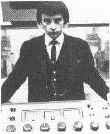
by Phil Mershon
(March 2003)
Had Phil Spector accomplished nothing more than recording The Ronettes singing "Be My Baby," he would deserve at least one get out of jail free card. More than any other producer working in rock, Spector completely redesigned the sound of contemporary music. By combining the R&B gusto of race records, massively overdubbing orchestrations inspired by classic pop, and reinvigorating (through whatever coercive means he deemed necessary) the talent in front of and behind the microphones, Spector went far beyond the legendary "wall of sound" for which he typically receives credit. He described it best when he stated his label released "little symphonies for kids." There was nothing patronizing in his assessment, either. No one brings in twenty to thirty of the world's most accomplished session players to work two days without sleep recording a three minute "symphony" unless the mad director is completely serious about the project.
The Crystals "There's No Other Like my Baby" (Philles, 1961), "He's Sure the Boy I Love" (Philles, 1962), "He's a Rebel" (Philles, 1962), "Then He Kissed Me" (Philles, 1963), "Da Doo Ron Ron" (Philles, 1963)
By 1960, Phil Spector was hanging around Leiber and Stoller and the other Brill Building writers, producing a few sets and keeping his ears open. Back in 1958 Spector had written, produced and sung on the Teddy Bears' "To Know Him is to Love Him," a hit that had snagged the Number One spot on the charts. At the age of nineteen, he was allowed to produce a few sessions for Atlantic Records. With the money he made there, he created his own record company, Philles. His first group was The Crystals, three seventeen-year-olds and two girls aged sixteen. The first Crystals record was "There's No Other Like my Baby," written by Spector and a mysterious L. Bates, backed with "Oh Yeah, Maybe Baby," also written by Spector. Barbara Alston sang lead on both sides. The record reached number twenty. The group would make the Top Forty five more times between then and 1963. One of their songs that did not soar to the top was the Spector/Goffin/King collaboration, "He Hit Me (and It Felt Like a Kiss)." Though the music trades were quick to praise its unique lyrics and ballad beat, the DJ's and station owners were outraged and the record was quickly withdrawn from release. Shortly, Phil bought out his two partners and decided to go it alone. Singer and songwriter Gene Pitney wrote "He's a Rebel" yielding one of the greatest records of all time, clearly setting the tone for the anti-macho attitudes of the decade. What had heretofore been seen as weaknesses were now revered as strengths. Beyond the sheer word power was the sound of the record. With Leon Russell on keyboards, Larry Knechtel on bass, Barney Kessel and Glen Campbell on guitars, Sonny Bono on percussion, Steve Douglas on horns, Lou Blackburn on trombone, Hal Blaine on drums, and stirring it all together was arranger Jack Nitzsche. The product was a great and busy Crystals record--except that none of The Crystals sang lead. That task was awarded to Darlene Love who, Spector reckoned, was more of a professional than Alston, Lala Brooks, Pat Wright or Dee Dee Kennibrew. Whether correct in that assessment, the song did become the label's first Number One.
The Crystals "Uptown" (Philles, 1962)
This was actually sung by The Blossoms, a Hollywood studio group led by Darlene Love. Darlene really made the rounds in those days, singing as The Crystals, plus with Bob BB. Soxx and the Blue Jeans, with The Blossoms, and as regular backing singers on TV's "Shindig." Here, she and the Blossoms are reliving producer Phil Spector's teenaged memories better than he might have himself, making his work on this and Lennon's more militant songs a very short leap.
Darlene Love "Christmas (Baby, Please Come Home), "A Fine Fine Boy," and "Today I Met the Boy I'm Going to Marry" (Philles, 1963)
As the frequently unaccredited lead vocalist for both The Crystals and Bob B. Soxx and the Bluejeans, Darlene Love had a fine solo career, charting with both "The Boy I'm Going to Marry" and "Wait 'Til My Bobby Gets Home." Her very best recorded effort, "Christmas," appeared on producer Phil Spector's Christmas Album. It was also on the soundtrack for the movie Gremlins.
Bob B. Soxx & the Blue Jeans "Zip a Dee Doo Dah" (Philles, 1963), "Why Do Lovers Break Each Other's Hearts," Philles, 1963
Spector wanted a male singer who sounded like Clyde McPhatter (formerly of the Dominoes and later the Drifters). Robert Sheen, aka Bob B. Soxx, came closer than anyone in the producer's stable. Too bad he only gets to do backing dum-dee-dum's on these songs. Well, too bad for him, anyway. Darlene Love made these songs as much as did the producer, singing lead on these, the organization's only two hits. Anyone who can take a stale Disney tune and make it salacious, much less cover a Frankie Lymon and the Teenagers number and nearly obliterate memories of the original version deserves to be the lead singer in a group named for a guy.
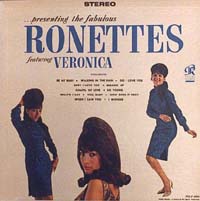 The Ronettes Presenting the Fabulous Ronettes, Featuring Veronica (Philles, 1964)
The Ronettes Presenting the Fabulous Ronettes, Featuring Veronica (Philles, 1964)
Innocence is not a requirement for purity, as this album proves. Nedra Talley, Estelle Bennett, and right up front, Veronica Bennett (later Spector) sounded more in love with being in love than any other girl group. Simple lines like "For every kiss you give me/I'll give you three" say more about the absolute need of the savage teenage experience than any lyrics ever voiced. The sound effects for the opening number set the ambience, because it is always starting to rain when Ronnie sings. "Be My Baby," with Hal Blaine's divinely inspired drumming (especially the fade-out), is the fullest plea for reciprocity beckoned by mortals. One of the most fun is "Breaking Up," which, swear to God, sounds like the Beach Boys if they were girls. The album closer, "Chapel of Love," is so substantially different from the hit version by the Dixie Cups, that it becomes a different song. And everything else in between is gorgeosity made flesh. Producer (and Veronica's husband) Phil Spector may or may not have been projecting his ideas of the perfect woman here. But he certainly found and refined the perfect sound.
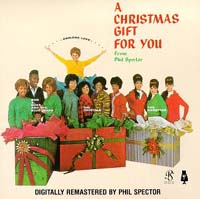 Various Artists A Christmas Gift to You (Philles, 1963)
Various Artists A Christmas Gift to You (Philles, 1963)
The only way the title of this album could be more accurate is if it were free (though if you want to take the title literately, this would make a great present for someone you care about). The alternate cover version with Phil dressed up as Jolly Ol' St. Nick is a hoot also. It's still the hippest holiday album around, only challenged by Run-DMC's "Christmas In Hollis." As much as you might go crazy from hearing all the holiday songs played on endless repeat in every store you walk into around December, this is one that demands to be replayed- there isn't one bad song here but the one for the ages has to be the Ronnettes' version of "Frosty the Snowman" (though how could you pass up Darlene Love's "Winter Wonderland" or the Crystals' "Santa Claus Is Coming To Town"?) Sad to say though, this platter of merry holiday cheer didn't sell too well in its time but neither did Pet Sounds, right?
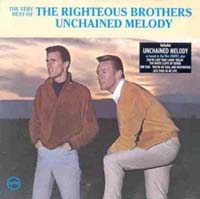
This duo's name sounded like a cross between a choir and a street gang, and yet their vocals and arrangements made distinctions of race nonexistent. For that matter, the power of their early productions could make you forget your own color. Even though audiences have known intellectually for thirty-five years that Bill Medley and Bobby Hatfield were white as chalk, you sure can't tell by listening to any of these songs. Their first hit was "Little Latin Lupe Lu" on Moonglow. Mitch Ryder and the Detroit Wheels, another racially ambiguous group, picked up on the sound and released their own version, the last time anyone would out-righteous these brothers. Turning themselves over to a teenaged millionaire, Medley and Hatfield began a healthy streak of softer, more powerful ballads with Phil Spector's perfect production. Probably the most familiar lyrics on this planet begin "You never close your eyes…" an endlessly mature image from a company whose stated goal was to make symphonies for kids. And yet there were symphonic qualities to the vocal arrangements in "You've Lost That Lovin' Feelin'," as well as in "Just Once in My Life," "Unchained Melody" and "Ebb Tide," all on the Philles label. By 1966 Bill and Bobby convinced themselves that they were the true geniuses of the operation and left Spector for Verve. There they made one fine "Lovin' Feelin'" rip off that worked well, called "(You're My) Soul and Inspiration." Soon enough the millions stopped and the pair split up. Various solo projects had all the appeal of Sonny Bono in drag and eight years later they reunited and it felt so good that "Rock and Roll Heaven" resulted. Although they charted a couple more times on Haven, the magic had abandoned this mortal coil.
Sonny Charles and the Checkmates Ltd. "Black Pearl" (A&M, 1969)
Aside from being a first class pop symphony that uses the passion of its sentiment and the force of its assault to motivate listeners to sway with abandon, this song is also notable for being one of Phil Spector's last great productions of black music for a bi-racial community. Sonny Charles sings to the servant girl who use to take care of white folks' kids. Today, he's going to take her away from all that and treat her the way she's always deserved. His pledge isn't economic. He offers her no guarantees that life will be easy; but if he cares as much as the orchestra makes it sound like he does, one way or another, she'll be set for life.
The Beatles Let It Be (Apple, 1970)
When the emphasis, once again, is on interesting rather than on compelling, there are likely to be moments of disappointment. Nothing says this better than the end of the final song, where instead of roaring back after the fake ending on the single, they simply trail off, saying thanks to Ringo's wife and making the ironic remark about passing the audition, which is somehow, for a Beatles' album, insubstantial. And while there is absolutely nothing else here that compares with the splendor of any of their first five albums, "Two of Us" and "I've Got a Feeling" do display a friendliness and friendly competitiveness between the two chief songwriters that was always one of the more enjoyable aspects of The Beatles persona. Sometimes I think the best thing on this album is the throwaway filler "Dig It" (though the strings/choirs on "Across the Universe" and "The Long and Winding Road" sound more appropriate on the original version than on the recent scrubbed up/down version of the record).
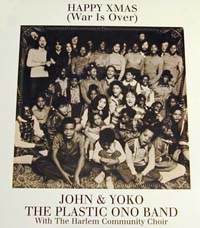 John & Yoko "Happy Xmas (War is Over)" (Apple, 1971)
John & Yoko "Happy Xmas (War is Over)" (Apple, 1971)
Rock ‘n' roll has not given the world all that many great Christmas songs. I can think of maybe two dozen; not much in forty years (though note the holiday album that Uncle Phil did above almost a decade before this one came out). This is one of the best for several reasons. First, it was one of the last great Phil Spector productions. Second, it was the one great collaboration between the two principals. Third, it had a swirling chorus that spiritually and musically unified the verses. Fourth, it used the implicitly understood love of John and Yoko as an example to the world of how happy they too could be (snicker all you want at the naivete of this but it's a really nice, sweet sentiment nevertheless). Fifth, it urged the listener to use her or his mind as an instrument of power to end human suffering (again, a very nice sentiment however you'd like to take that). And sixth, it was released on seasonally cheery green vinyl. If that all sounds a bit new age myopic to you still, all I can say is there are still times when even the near-sighted may find it a relief to just listen to this instead of just being a Scrooge.
John Lennon Sometime in New York City (Apple, 1972)
About ten years ago, here's what I wrote about this album: "This is among the most muddleheaded albums ever recorded by a major artist. John had seemingly forgotten the lessons of "Help" and Plastic Ono Band: that you can say more by saying less. Wordy, preachy, untuneful and separatist, you knew John was in trouble when the best song on the album was sung by his wife."
So, time's change. It turns out that while everything I said then about the album is accurate, I now see all that as good. After the stark minimalistic rock of Plastic Ono Band, Spector helped Lennon fervent imagination run wild. Besides, the Elephant's Memory Band--especially saxophonist Stan Bronstein--actually gave the songs tremendous punch without sacrificing subtlety. The last six songs are recorded on a separate disc with Frank Zappa and the Mothers, and while not as tight as Elephant's Memory, still knock down walls. The topicality of the main disc is really not a problem for listeners, because history books certainly don't offer any of this, and even if they did, it wouldn't be as mind shattering. I mean, how many history books actually talk about British troops shooting down Irish civilians, or the ten year prison sentence of a smart agent provocateur caught with two joints, or the murder of forty-three people at a New York state prison? This album--musically, lyrically, politically, and even ecologically--assaulted the senses of friend and foe alike. "There goes crazy John, off on another parade!" Maybe so. But no one of his stature ever considered equating the plight of oppressed women with the plight of oppressed African Americans, especially not in a pop song that the singer genuinely believed would receive massive radio play! Once the album is reduced to its core, we're left with nothing but guts--and an album that sounds exactly like courage confronting the unfriendly end of a buzz saw.